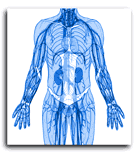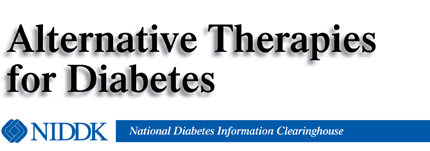

Acupuncture
Acupuncture is a procedure in which a practitioner inserts needles into designated points on the skin. Some Western scientists believe that acupuncture triggers the release of the body's natural painkillers. Acupuncture has been shown to offer relief from chronic pain. Acupuncture is sometimes used by people with neuropathy, the painful nerve damage of diabetes.
Biofeedback
Biofeedback is a technique which helps a person become more aware of and learn to deal with the body's response to pain. This alternative therapy emphasizes relaxation and stress-reduction techniques. Guided imagery is a relaxation technique that some professionals who use biofeedback do. With guided imagery, a person thinks of peaceful mental images, such as ocean waves. A person may also include the images of controlling or curing a chronic disease, such as diabetes. People using this technique believe their condition can be eased with these positive images.
Chromium
The benefit of added chromium for diabetes has been studied and debated for several years. Several studies report that chromium supplementation may improve diabetes control. Chromium is needed to make glucose tolerance factor, which helps insulin improve its action. Because of insufficient information on the use of chromium to treat diabetes, no recommendations for supplementation yet exist.
Magnesium
Although the relationship between magnesium and diabetes has been studied for decades, it is not yet fully understood. Studies suggest that a deficiency in magnesium may worsen the blood sugar control in Type 2 diabetes. Scientists believe that a deficiency of magnesium interrupts insulin secretion in the pancreas and increases insulin resistance in the body's tissues. Evidence suggests that a deficiency of magnesium may contribute to certain diabetes complications.
Vanadium
Vanadium is a compound found in tiny amounts in plants and
animals. Early studies showed that vanadium normalized blood glucose
levels in animals with Type 1 and Type 2 diabetes. A recent study found
that when people with diabetes were given vanadium, they developed a
modest increase in insulin sensitivity and were able to decrease their
insulin requirements. Currently researchers want to understand how
vanadium works in the body, discover potential side effects, and establish
safe dosages.
Additional Information on Alternative Therapies for Diabetes
The National Diabetes Information Clearinghouse collects resource information on diabetes for Combined Health Information Database (CHID). CHID is a database produced by health-related agencies of the Federal Government. This database provides titles, abstracts, and availability information for health information and health education resources.
To provide you with the most up-to-date resources, information specialists at the clearinghouse created an automatic search of CHID. To obtain this information you may view the results of the automatic search on Alternative Therapies for Diabetes.
 Or, if you wish to perform your own search of the database,
you may access the CHID Online web site and search CHID yourself.
Or, if you wish to perform your own search of the database,
you may access the CHID Online web site and search CHID yourself.
National Diabetes Information Clearinghouse
1 Information Way
Bethesda, MD 20892-3560
E-mail: ndic@info.niddk.nih.gov
The National Diabetes Information Clearinghouse (NDIC) is a service of the National Institute of Diabetes and Digestive and Kidney Diseases (NIDDK). The NIDDK is part of the National Institutes of Health under the U.S. Department of Health and Human Services. Established in 1978, the clearinghouse provides information about diabetes to people with diabetes and their families, health care professionals, and the public. NDIC answers inquiries; develops, reviews, and distributes publications; and works closely with professional and patient organizations and Government agencies to coordinate resources about diabetes.
Publications produced by the clearinghouse are reviewed carefully for scientific accuracy, content, and readability.
This e-text is not copyrighted. The clearinghouse encourages users of this e-pub to duplicate and distribute as many copies as desired.
e-text posted: 17 March 1998